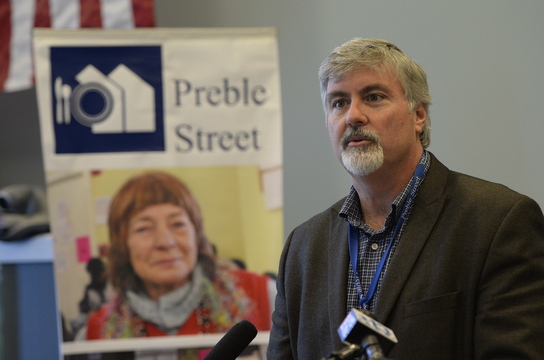A Westbrook lawmaker is proposing a pilot project that would provide drug treatment and emergency housing to homeless people struggling with addiction in response to unprecedented overdose deaths in Maine.
Rep. Drew Gattine, D-Westbrook, said he agreed to introduce the bill after being approached by representatives of Preble Street, the nonprofit that provides services to Portland’s homeless population. The bill, which will have a public hearing in Augusta this week, would direct Maine’s Department of Health and Human Services to create a program offering medication-assisted treatment – such as methadone or Suboxone – and access to “stable housing” for up to 50 people.
It is among a slew of bills under consideration by lawmakers seeking to address an opiate addiction crisis that is killing, on average, more than one Mainer per day.
“We keep talking about it but clearly we are not doing enough,” said Gattine. “This bill seeks to address the problem the people at Preble Street brought to me, but it is a statewide problem.”
Gattine said the pilot project would focus initially on one urban and one rural area in recognition of the connection between substance abuse and homelessness throughout Maine.
Maine recorded 376 drug overdose deaths in 2016 – more than double the number just three years earlier – and was on a similar pace for 2017 as of midyear. The Maine Attorney General’s Office is still compiling the overdose statistics for all of 2017.
Access to drug treatment in Maine is limited, especially for those without insurance or the means to pay out-of-pocket. Faced with a surge in drug overdoses at their downtown facility, Preble Street staff members have become de facto first responders to attempt to revive individuals suffering from the deadly effects of opiate overdose.
Last year, staff at the nonprofit had to use the overdose reversal drug naloxone or take other emergency steps, on average, once every eight days for overdoses.
“For us, it is as real and as tragic as it comes,” Preble Street executive director Mark Swann said in a statement. “Every day – every single day – people plead with us for housing and treatment options. And every day – every single day – we can barely offer them even a glimmer of hope.”
Gattine, who co-chairs the budget-writing Appropriations and Financial Affairs Committee, acknowledged that the pilot project envisioned in his bill would require funding. But he said the bill’s bipartisan list of co-sponsors – six Democrats and four Republicans – is a start of coalition building needed to address the opioid crisis.
The bill would also require cooperation from Maine DHHS, which Gattine said has been slow to implement other drug treatment initiatives approved by the Legislature.
“As legislators, we have to do our jobs by moving things forward,” Gattine said. “But I also think we have to monitor the department and continue to pressure them to do what they need to do.”
The Legislature’s Health and Human Services Committee is slated to hold a public hearing on the bill, L.D. 1711, at 9:30 a.m. Wednesday.
Kevin Miller can be contacted at 791-6312 or at:
Twitter: KevinMillerPPH
Send questions/comments to the editors.





Comments are no longer available on this story